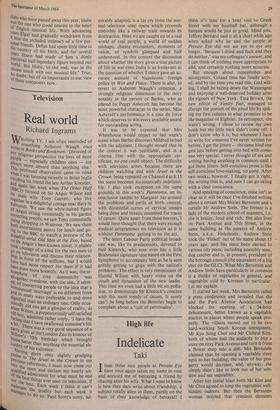Television
Real world
Richard Ingrams
Watching TV, I am often reminded of something Auberon Waugh once wrote in Books and Bookmen: 'Divorced of any religious perspective the lives of most 13.,,e°131e — especially childless ones — are, ,._.'"ways more absurd than anything else.' profound his profound observation came to mind when I was listening recently to Brian Inglis extolling his friend the late Arthur Koestler, and again last week when The Other Half (RCl) focused on Sir Angus Wilson and !Its male wife Tony Garrett, who live together in a delightful cottage near Bury St unds. We saw the white-haired figure of Angus sitting contentedly in his garden correcting proofs; we saw Tony contentedly (bong shopping in Waitrose. We saw them oth entertaining guests for lunch and go- ing to the BBC to watch a preview of the dreadful serial Old Men at the Zoo, based " Sir Angus's best-known novel. It plainly took courage of a kind for the two men to hi television and discuss their relation- hn in front of the millions, but I would been had more respect for them if it had 'e'en done more honestly. As it was, the at- r1°sPhere of cosy domesticity was altogether overdone, with the aim, it seem- eji, of converting people to the idea that a "onto. sexual 'marriage' is no different from and .In many ways preferable to and more nignified than an ordinary one. Only occa- swionally did one get a glimpse of reality, as 0:len Wilson, a preposterously self-satisfied f2,.hoY , admitted rather coyly, 'I have the that I have swallowed someone's life " lt u.' There was a very good sequence of a 11,71.Y given at the London Zoo in honour of 70th birthday which brought 4 _1111011-1,erdIt better than anything the essential ab- Y of his existence. !avin given only slightly grudging Praise to The Jewel in the Crown in my previous references, I must now come out t,°.the open and declare my nearly un- 07,1f-led admiration for what must be one tne best things ever seen on television, if n'llot the best. Each week I think it can't manages the quality but each week it `iages to do so. Paul Scott's storY, ad- mirably adapted, is .a far cry from the nor- mal television soap opera which proceeds smoothly like a railway train towards its destination. Here we are caught up in a real world of real people, a world of sudden mishaps, chance encounters, moments of vision, of symbols glimpsed and half understood. In this context the discussion about whether the story gives a true picture of life in war-time India is as irrelevant as the question of whether Tolstoy gave an ac- curate account of Napoleonic foreign policy in War and Peace. There is also, to revert to Auberon Waugh's criterion, a strongly religious dimension to the story notably in the person of Barbie, who as played by Peggy Ashcroft has become the most powerful character in the series. Miss Ashcroft's performance is a tour de force which deserves to win every available award for outstanding acting.
It was to be, expected that Mrs Whitehouse would object to last week's scene when Barbie discovers Mildred in bed with the adjutant. I thought myself that in the context it was justifiable, and in a cinema film with the appropriate cer- tificate, no one could object. The difficulty with television arises because there are children watching and with Jewel in the Crown being repeated on Channel 4 at 8.15 the scene becomes automatically indefensi- ble. I also took exception on the same grounds to this week's Panorama, an in- conclusive ramble by Margaret Jay around the problems and perils of birth control, with distasteful scenes of cervical smears being done and breasts examined for traces of cancer. Quite apart from these horrors, I would have thought that there were enough medical programmes on television as it is without Panorama getting in on the act.
The latest Labour Party political broad- cast was, like its predecessors, devoted to Neil Kinnock, who now even has a little Brahmsian signature tune based on the First Symphony to accompany him as he is seen grittily getting to grips with the nation's problems. The effect is very reminiscent of Harold Wilson with heavy stress on the youth and dynamism of the new leader. This time we even had a little bit on pollu- tion, to demonstrate Mr Kinnock's concern with this most trendy of causes. It surely can't be long before the Bennites begin to complain about a 'cult of personality'.






































 Previous page
Previous page